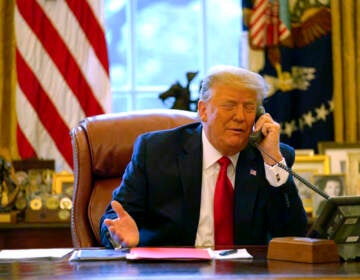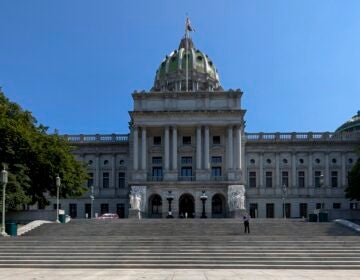Trump indictment spells out connections to Pennsylvania in efforts to overturn election
Tuesday's indictment lists a co-conspirator who spread disinformation at a November 2020 meeting in Pa. The meeting was arranged by Giuliani and presided over by Mastriano.

President Donald Trump arrives to speak in the East Room of the White House, early Wednesday, Nov. 4, 2020, in Washington. (AP Photo/Evan Vucci)
What you need to know
- Here are seven key takeaways from what the indictment calls a campaign of “fraud and deceit.”
- The election-meddling probe against Trump is sprawling. Here’s a breakdown of the case.
- Here’s where the rest of the Trump investigations stand, and why Trump’s “fake electors” in Pa. are likely to avoid prosecution.
This story originally appeared on WITF.
The four-count indictment leveled against former President Donald Trump Tuesday lists six unnamed co-conspirators who helped advance his scheme to stay in power, despite losing the 2020 presidential election.
One of them, court documents say, “orchestrated an event at a hotel in Gettysburg attended by state legislators.”
“Co-Conspirator 1 falsely claimed that Pennsylvania had issued 1.8 million absentee ballots and received 2.5 million in return,” prosecutors wrote.
The indictment refers to the Nov. 25, 2020, meeting arranged by former Trump lawyer Rudy Giuliani – and presided over by state Sen. Doug Mastriano (R-Franklin).
Giuliani and Mastriano spent more than three hours highlighting false claims about the 2020 presidential election in Pennsylvania – including Giuliani’s disproven assertion that the state received more mail-in ballots than were issued.
The meeting was not a legislative hearing, and no one testified under oath. But Giuliani and Mastriano spread lies about voter fraud and promoted a false slate of electors to transmit a Trump victory to Congress.
Republican strategist Sam Chen said the meeting wouldn’t have implicated Trump if only Mastriano and state legislators were involved.
“Because they brought Giuliani here, there is a member who has been representing the Trump campaign, now it puts the Trump campaign directly involved with the Gettysburg meeting, and that’s where it becomes significant,” he said.
However, Chen said the “false electors” are unlikely to be prosecuted, as their plan included language that only required their votes if they were “ultimately recognized as being the duly elected and qualified electors” in Pennsylvania.
In other states, the false electors did not include that contingency language, instead representing themselves as the true electoral college representatives. Sixteen of them in Michigan now face eight felony charges each.
“If these are not official meetings, these weren’t official votes taken. It’s a thin line to then accuse somebody trying to overthrow the government or conspire against the United States, which is one of the charges,” he said.
Another co-conspirator appears to be former Acting Assistant Attorney General Jeff Clark of Philadelphia, who promised to look into Trump’s false claims of election fraud if promoted to attorney general.
In the indictment, “Co-conspirator 4” is described as “a Justice Department official who worked on civil matters.” The indictment states, “Co-Conspirator 4 sent a draft letter to the Acting Attorney General and Acting Deputy Attorney General, which … contained numerous knowingly false claims about the election and the Justice Department.”
That information matches testimony to the Jan. 6 Select Committee about Trump’s effort to install Clark, who was an environmental lawyer in the DOJ at the time.
Clark was introduced to Trump by midstate Congressman Scott Perry (R-York), who pushed election conspiracy theories and refused a subpoena to testify before the House January 6th Select Committee.
Former Acting Deputy Attorney General Richard Donoghue told the committee how Perry urged Trump to install Clark as A.G.
“He mentioned Mr. Clark. He said something to the effect of, ‘I think Jeff Clark is great. I think he’s the kind of guy who can get in there and do something about this stuff,” Donoghue testified.
Just days before the Capitol attack, select committee records show, Perry texted then White House chief of staff Mark Meadows to check on Clark’s status.
“We gotta get going!” Perry wrote.
Perry acknowledges introducing Clark and Trump, but said, “Throughout the past four years, I worked with Assistant Attorney General Clark on various legislative matters. When President Trump asked if I would make an introduction, I obliged.”
Trump declined to promote Clark after senior DOJ officials, including Donoghue, threatened to resign in protest.
The four charges leveled against Trump by the Justice Department are:
- Conspiracy to Defraud the United States
- Conspiracy to Obstruct an Official Proceeding
- Obstruction of and Attempt to Obstruct an Official Proceeding
- Conspiracy Against Rights.
Trump is scheduled to appear for arraignment Thursday.
Neither Mastriano nor Perry has been charged with any crime.
WHYY is your source for fact-based, in-depth journalism and information. As a nonprofit organization, we rely on financial support from readers like you. Please give today.







